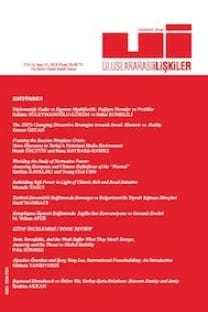Ekonomik Bütünleşme/Siyasal Parçalanmışlık Paradoksu: Avro Krizi ve Avrupa Birliği'nin Geleceği
2008 yılından bu yana avro bölgesi derin bir ekonomik kriz içerisinde adeta varoluş mücadelesi vermektedir. Kriz ilk ortaya çıktığı andan itibaren avro bölgesi üyeleri, sorunun yapısal nedenlerini ortadan kaldırmaya odaklanan çok-boyutlu ve eş-zamanli tedbirler almak yerine birbirini “suçlama yarışına” girmiştir. Konuya politik ekonomi perspektifinden yaklaşan bu makalede, avro bölgesindeki krizin temelinde, “üye ülkelerin sorumsuz politikalarından” ziyade avro bölgesinin mimarisinden kaynaklanan yapısal sorun olan “ekonomik bütünleşme/siyasal parçalanmışlık” paradoksu olduğu iddia edilmektedir. Avro bölgesinin geleceği, Birlik üyelerinin bu paradoksa nasıl cevap vereceklerine göre şekillenecektir. Bu eksende daha az üye ile daha fazla bütünleşme öngören ancak monolitik AB mimarisi idealini de gündeminden düşüren “A la carte Avrupa” modelinin, AB bütünleşmesinde “ikinci en iyi çözüm” olarak önümüzdeki dönemde gündeme geleceği vurgulanmaktadır. Tüm bu gelişmelerin Türkiye-AB ilişkilerinde “imtiyazli ortaklık” değil, “esnek üyelik” modeline somut uygulama alanı sağlayacağı öngörülmektedir.
Anahtar Kelimeler:
Avro Bölgesi Krizi, Ekonomik Bütünleşme/Siyasal Parçalanmışlık Paradoksu, Çok Vitesli Avrupa, A la carte Avrupa, Değisken Geometrili Avrupa, Türkiye-AB İlişkilerinin Geleceği
Economic Integration/Political Fragmentation Paradox:The Euro Crisis and the Future of European Union
The Euro-zone project has been struggling for survival since it was hit hard by the global financial crisis in 2008. When the crisis first erupted, the member countries immediately plunged into a vicious cycle of ‘blame-game’ by trying to transfer the burden on the shoulders of other members. In this article, we argue that the structural problems pertaining to the very architecture of the Euro-zone rather than the individual policy choices of member states were at the heart of the deep crisis that the European Union is currently confronted with. Our central argument, therefore is that the ‘economic integration/political fragmentation’ paradox constitutes a central underlying element of the Euro-zone crisis. We claim that the future of the Euro-zone and thereby the European Union will mainly be shaped by the response of the European leaders to the economic integration/political fragmentation paradox. The most likely response of the EU to this paradox will be a La Carte Europe, which foresees different integration level among EU member countries. Finally, the type of European leaders’ response to the paradox in question will closely aff ect the future of Turkey-EU relations. The emergence of a more flexible Europe may open up new avenues for Turkey-EU relations.
Keywords:
Euro-zone Crisis, Economic Integration/Political Fragmentation Paradox, Multi Speed Europe, A La Carte Europe, Variable Geometry Europe, Future of Turkey-EU Relations,
___
- ......
- ISSN: 1304-7310
- Başlangıç: 2004
- Yayıncı: Uluslararası İlişkiler Konseyi Derneği İktisadi İşletmesi
Sayıdaki Diğer Makaleler
Avrupa’daki Radikal Sağ Partiler ve Balkanlı Kuzenleri: Çanlar Türkiye İçin Çalıyor
Ekonomik Bütünleşme/Siyasal Parçalanmışlık Paradoksu: Avro Krizi ve Avrupa Birliği'nin Geleceği
Levant’ta Büyük Oyun: Doğu Akdeniz’in Enerji Jeopolitiği
Volkan Ş. EDİGER, Balkan DEVLEN, Deniz Bingöl MCDONALD
Araştırma Merkezlerinin Yükselişi, Türkiye’de Dış Politika ve Ulusal Güvenlik Kültürü
Birleşmiş Milletler Palmer (Mavi Marmara) Raporu ve Uluslararası Hukuk
Çin’in Değişen Enerji Stratejisinin Dış Politikasına Etkileri (1990–2010)
Vamık D. VOLKAN, Kıbrıs: Savaş ve Uyum Çatışma İçindeki İki Etnik Grubun Psikanalitik Tarihi
